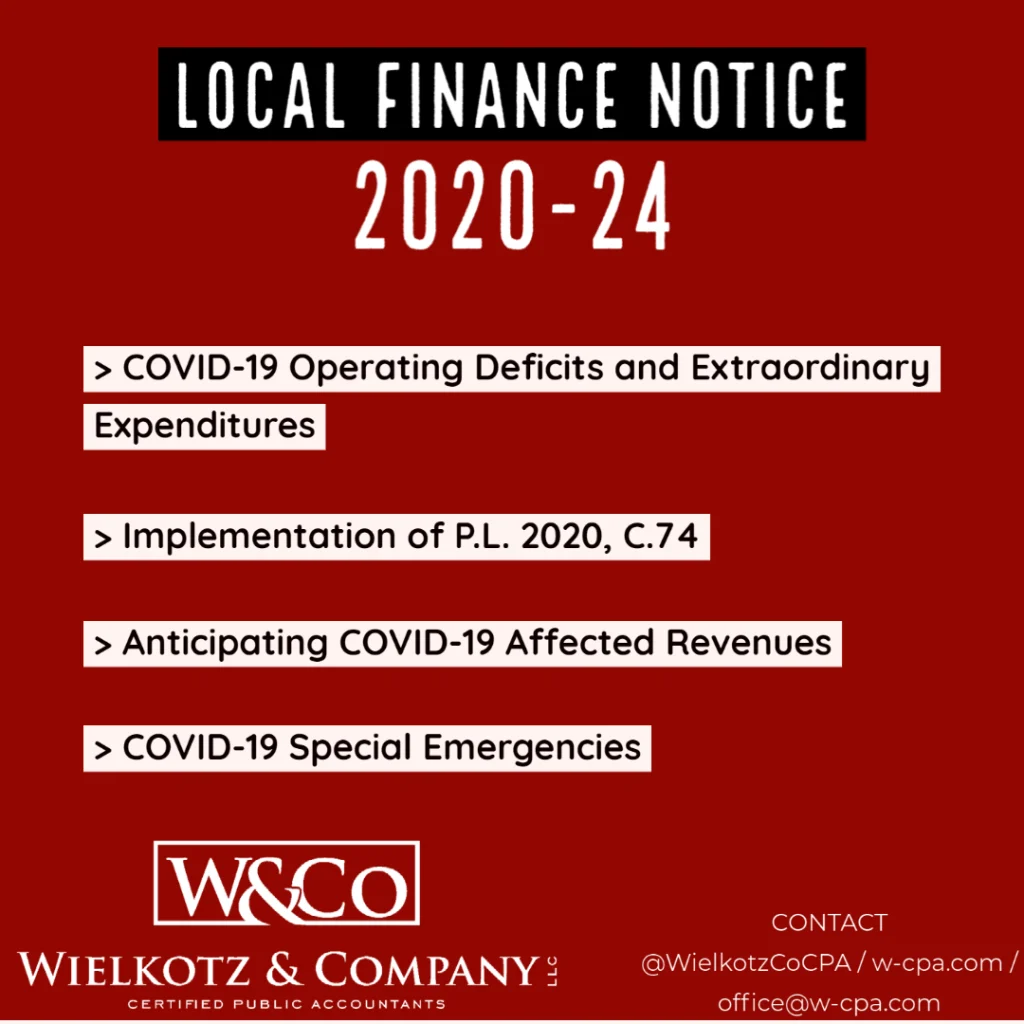New Jersey Division of Local Government Services Local Finance Notice 2020-24

Local Finance Notice 2020-24 – COVID-19 Operating Deficits and Extraordinary Expenditures: Implementation of P.L. 2020, C.74

COVID-19 Operating Deficits and Extraordinary Expenditures: Implementation of P.L. 2020, C.74
P.L 2020, c.74 enacted 8/31/2020, empowers local governments to alleviate fiscal impacts related to the COVID-19 emergency through the measured use of existing budgetary and debt structures that have been reshaped to meet the local units’ emerging needs during the COVID-19 emergency.
Municipalities and counties facing substantial budget shortfalls tied to the COVID-19 pandemic now have the flexibility to spread an otherwise unsustainable single-year impact over several years. Governing bodies can minimize taxpayer hardship, continue needed capital improvement projects, and preserve the essential services that are especially critical during this time.
Standards for Anticipating COVID-19 Affected Revenues
For FY2021, the Director authorizes use of a three-year average for calculation of affected revenues, which shall be calculated in a manner consistent with Reserve for Uncollected Taxes (RUT) calculation used.
COVID-19 Special Emergencies – Certain Related Costs
P.L. 2020, c.74 Allows a municipality or county to authorize special emergency appropriations for “the immediate preparation, response, recovery, and restoration of public services during the COVID-19 public health emergency.”
Qualifying costs include, but not limited to, signage, physical reconfiguration of workspace, personal protective equipment (PPE), and sanitizing measures.
A special emergency for extraordinary COVID-19 expenses can be financed by special emergency notes pursuant to N.J.S.A. 40A:4-55.
COVID-19 Special Emergencies – Operating Deficit
Qualifying operating deficits include documented COVID-19 affected revenue loss or additional expenditures. Local units need only demonstrate the operational gap and are not required to deplete surplus to qualify. This applies to the general fund as well as to deficits in utility budgets.
Documenting and Certifying COVID-19 Related Revenue Loss and/or Additional Expenditures
Any municipality or county seeking to appropriate a COVID-19 related deficit experienced in 2020 or 2021 (or FY2020 or FY2021 for State Fiscal Year municipalities) must make written application to the Division Director in the prescribed form, available on the Division’s website.
Using the form specified by the Director and available on the Division’s website, the Chief Financial Officer shall certify that the deficit is directly attributable to COVID-19 and submit the form to dlgs@dca.nj.gov with “COVID-19 Special Emergency” as the subject heading.
The Chief Financial officer shall submit the certification for approval by a majority of the full governing body. A municipality or county seeking approval for a special emergency under this provision shall apply for any financial assistance that may be available from the federal government, the State, and other sources to offset any qualifying deficit directly attributable to COVID-19. Any such financial assistance obtained by the local unit shall be used to offset any deficit.
Funding the Special Emergency
Once approved by the Director, the special emergency may be raised in the budget over a five-year period with no appropriation for the deferred charge required in the first year.
A municipality or county that would experience substantial financial hardship by appropriating for the deferred charge over the automatic six-year emergency period may seek Local Finance Board approval to make the appropriations over up to 10 years.
This special emergency process affords a municipality or county significant time to compensate for lost revenues and achieve recovery, effectively authorizing a no-interest loan within the entity’s own budget to absorb revenue losses, potentially mitigating the need to borrow to fill these gaps.
Issuance of Special Emergency Notes
If the special emergency for a COVID-19 related operating deficit is approved by the Director, a municipality or county may issue a special emergency note to address the cash flow and appropriations needs related to the deferred charge.
Local Finance Notice 2020-14
Please follow the link below to read more about these items and guidance on how your local unit can implement them: https://www.nj.gov/dca/divisions/dlgs/lfns/20/2020-24.pdf
Contact Wielkotz & Company, LLC Today
For further information on Local Finance Notice 2020-24 and its implementation feel free to reach out to Steven Wielkotz at (973)-835-7900 ext. 201 or sdw@w-cpa.com.


